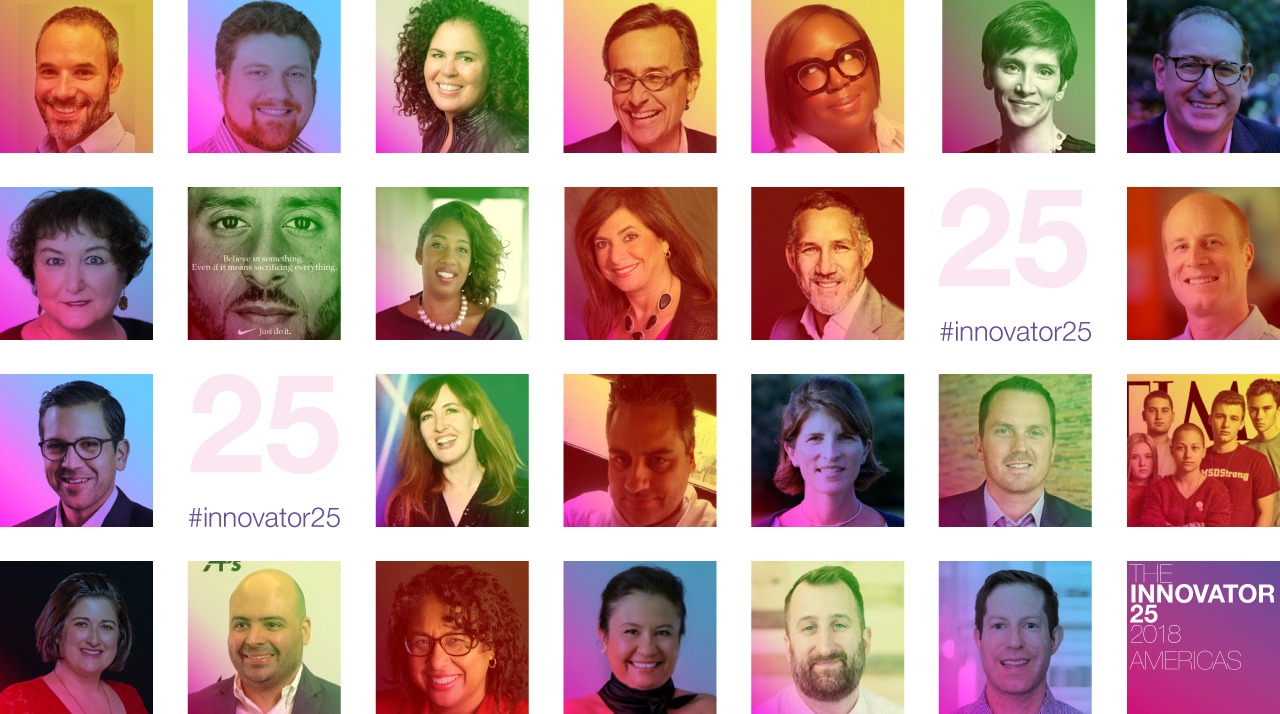
Adam Wall
EVP, Digital Operations & Clients Services North America
Weber Shandwick
New York
“Technology is a critical enabler but not necessarily a prerequisite for innovation to occur. Vision and leadership, on the other hand, are inextricably linked to innovation.”
Weber Shandwick has long been on the forefront of content creation and digital services — most recently pushing the boundaries around innovation with developments in AI and device interaction, and the creation of a new Tech + Innovation Center, offering everything from e-commerce solutions to advanced analytics. That’s what ultimately lands Adam Wall, who leads the agency’s digital innovation team, on this year’s list. Not only has he applied innovation to clients like Chevy and GSK, he also helped lead the recent acquisitions of two firms that further bolster Weber Shandwick’s capabilities in data analytics and performance marketing, Resolute Digital and Bomoda.
In what area(s) does the PR need to innovate the most?
Diversity, analytics and measurement, management, integration, media relations
How would you describe the communications/PR industry's level of innovation compared to other marketing disciplines?
I think the various disciplines within the marketing communications industry are too distinct from each other to fairly evaluate in terms of level of innovation, but I would go as far as to say that the PR industry has arguably come the farthest and continues to have the most blue sky to innovate even further.
Where is the PR industry's greatest opportunity for taking the lead on innovation?
Analytics and measurement
Who most influences how innovative a brand's engagement is?
To the extent that innovation is a function of leadership and vision, one could argue that it's an organization's most senior leader (CEO) who most influences how innovative it is. However, I think the idea of singling out an executive that is most responsible for innovation loses sight of the remarkable and synergistic contributions that must also come, often equally so, from other seniors leaders in the C-suite and beyond.
How do you define innovation?
Most interpretations of innovation tend to include both a reference to change and introduction of something new, and often reflect technical advancement. To me, however, while those partial descriptions are all correct, innovation must involve an unquestionable betterment of whatever came before it. Technology is a critical enabler but not necessarily a prerequisite for innovation to occur. Vision and leadership, on the other hand, are inextricably linked to innovation. To that end, every function within an organization, including Finance, Operations, and Human Resources, is ripe for innovation.
What is the most innovative comms/marketing initiative you've seen in the last 12 months?
Easy. For me, it's
Nike's Breaking2 campaign from mid-2017 in which they set out to help three elite distance runners attempt a sub two-hour marathon. Innovation was at the core of every aspect of the program, starting with the audacity of the attempt to innovate their way to a world record many believed could not be broken, to the athlete selections, the biometric analysis, the design of the hero product Nike Vaporfly, the navigation of controversial publicity throughout, and perhaps most importantly from a marketing perspective, the outrageous volume of engagement from consumers, which included a live-stream audience of more than 13 million. It was bold. It was authentic. And it was remarkably innovative, in my opinion.
In your opinion, what brands and/or agencies are most innovative around PR and marketing?
Well, there are the usual suspects, like Apple, Amazon, Google and IBM (client) to name a few who consistently top all of the 'Most Innovative’ lists each year. I'm certainly a fan of some of the big industry disruptors like Netflix, Uber and Airbnb. But, while this may still sound obvious, I'll give a shoutout to Nike for reemerging as a true innovation powerhouse after what I consider to have been a teetering on the edge of losing its way in the early part of the last 5-7 years. Not only have they always been among the most innovative marketers, but I think their sponsorship and athlete endorsement strategy is very effective, and most importantly, in my opinion, they seemed to have figured out their [direct to consumer] approach and reduced their dependency on retail partners. I am also intrigued by the innovative ways individuals, especially celebrities and athletes, but other types of influencers as well, are leveraging new technologies and mediums to develop their personal brands in very innovative ways.
Describe a moment in your career that you would consider 'innovative.'
I'm proud to have worked over the years with brilliant colleagues on a wide range of truly innovative programs. Interestingly though, I think I'd point to the fact that the role I've played within our firm over the past 4 years didn't exist before I stepped into it as the most innovative moment of my career. We saw a leadership gap in an important area of our business and we designed a solution that hadn't yet been considered and didn't previously exist.
Who do you admire for his/her approach to innovation?
There are so many business leaders, including my own current boss, who I admire for their approach to innovation, but I'm going to take this outside the confines of business and say LeBron James. Everyone knows that LeBron has become one of the greatest basketball players of all-time and arguably one of the two or three most recognizable athletes in the world. What I admire about Lebron in terms of innovation though is his transformative influence on player mobility in the NBA, his willingness to publicly take a stand on political issues, which globally recognized athletes with large endorsement deals have traditionally been reluctant to do, for his adaptability on the court driven by a savant-level basketball IQ. Beyond his core craft, he has demonstrated excellent entrepreneurial instincts, owns his own sports management firm, ventured into media production (which I'm sure will only become more prolific with his move to LA), and achieves maximum impact with a adept use of his social handles. All-in-all, I think LeBron James is a true innovator for the blueprint he's drawn on a global sports icon should be.
How do you get out of a creativity rut?
It's a bit cliché, but some time, even a brief walk, on the beach always recharges my creative energy. Failing access to the beach, I generally need to immerse myself for a few hours in something entirely unrelated to the thing I'm trying to think creatively about.
What advice would you give to the PR industry around embracing innovation?
I'd say that embracing it is not enough, pursue it, make it happen. It is human nature to find comfort in or default to what is familiar and precedented or "worked before". In an industry that has already come so far in terms of innovation, but still has so much untapped potential to become the primary conductor of the marketing communications mix, it is especially important to challenge anything you're doing just because it's the way things have always been done.
What would you be doing if you weren't doing your current job?
I'd love to say I'd have been a professional baseball player, but it's certainly not my current position that's held me back from doing that. In all seriousness, I always thought I'd be a lawyer and possible translate that into athlete representation. I'm pretty happy with the ways things worked out.
Favorite book/movie/podcast/article that's not directly related to PR/marketing/business?
I'm a sucker for non-fiction books and podcasts with lessons drawn from sports that are directly or otherwise applicable to leadership or business. Team of Teams: New Rules of Engagement for a Complex World' by General Stanley McChrystal, while not about sports, is one of my favorites. 'The Next 100 Years' by futurist George Friedman is another favorite that's about neither sports nor business. From the world of pop culture, I'm a (proudly) self-proclaimed Marvel and Harry Potter nerd.


 Podcasts
Podcasts Videos
Videos Profiles & Interviews
Profiles & Interviews Crisis Review
Crisis Review Coronavirus
Coronavirus Trend Forecasts
Trend Forecasts Social & Digital
Social & Digital Technology
Technology Consumer
Consumer Employee Engagement
Employee Engagement Sports Marketing
Sports Marketing  Global PR Agency Rankings
Global PR Agency Rankings Agencies of the Year
Agencies of the Year Innovator 25
Innovator 25 Creativity in PR
Creativity in PR Asia-Pacific Communication Index
Asia-Pacific Communication Index SABRE Awards
SABRE Awards PRovokeSummit Global
PRovokeSummit Global PRovoke Media Regional Series
PRovoke Media Regional Series Agencies of the Year
Agencies of the Year Roundtables
Roundtables Agency Playbook
Agency Playbook.jpg) All Jobs
All Jobs






